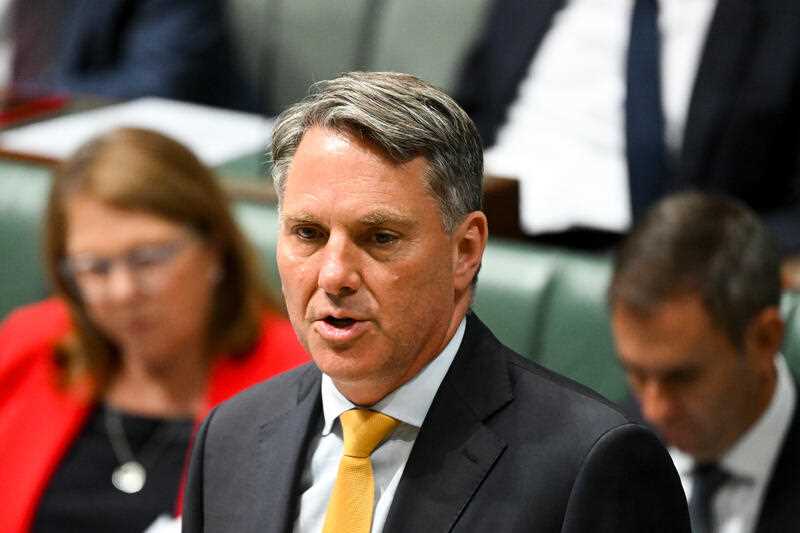Nuclear submarines will enable Australia to protect its sea trade routes, the defence minister says, after government backbenchers questioned the need for the technology.
In a speech to parliament on Wednesday, Richard Marles laid out the pathway to the submarines, renewing his pitch for the landmark military deal with the United States and United Kingdom set to cost Australia $368 billion.
- ‘No way to sugar coat’ massive nuclear submarine spend (14 March 2023)
Fremantle MP Josh Wilson told parliament earlier this week he was not convinced Australia needed the new submarines.
Three Labor members also questioned the deal in a caucus meeting with the prime minister.
But Mr Marles said acquiring the submarines would be a “game-changer” for Australia’s military capability and posture in the region.
“Our national interest and our national security extends beyond our shoreline. As an island trading nation, we are highly dependent on global trade,” he said.
“Almost 99 per cent of our trade by volume passes by sea … One doesn’t have to think hard to see what the impact would be if just this one trade route was disrupted by an adversary.”
He said at the heart of the decision to move ahead with AUKUS, a deal struck by the Morrison government, was the need to contribute to the collective security of the region and maintain the global rules-based order.
The defence minister said Australia’s current diesel-electric submarines would be increasingly diminished in capability in coming decades as they needed to surface to recharge their batteries.
“By the 2030s and 2040s, the only capable long-range submarine able to effectively operate in our ocean environment will be nuclear-powered submarines,” he said.
“As a corollary of their speed, stealth and endurance, a nuclear-powered submarine puts the biggest possible question mark in the mind of any potential adversary.”
Mr Wilson also questioned how nuclear fuel would be disposed of in Australia, noting the UK and US had struggled to deal with their decommissioned boats properly.
But Mr Marles said while the disposal of nuclear waste was a complex task, Australia had time to get it right.
The first nuclear-powered submarine will only need to be decommissioned in the 2050s.
A process to identify potential defence locations for waste storage and disposal is expected within the next 12 months.
Mr Marles said there would be public consultation about the locations, particularly with First Nations communities to ensure cultural heritage was respected and protected.
“This will not be a matter of set and forget,” he said.
“We will continue talking to the Australian people about why we are undertaking this transformational endeavour.”
Meanwhile, Prime Minister Anthony Albanese has been invited to attend a G7 leaders’ summit in Hiroshima in May by his Japanese counterpart Fumio Kishida.
The invitation comes after Mr Kishida told an event in India he wanted to work closer with Australia on a “free and open Indo-Pacific”.
Mr Albanese is expected to host the Quad leaders in Australia just after the summit.
By Maeve Bannister in Canberra
Get local, national and world news, plus sport, entertainment, lifestyle, competitions and more delivered straight to your inbox with the Canberra Daily Daily Newsletter. Sign up here.



